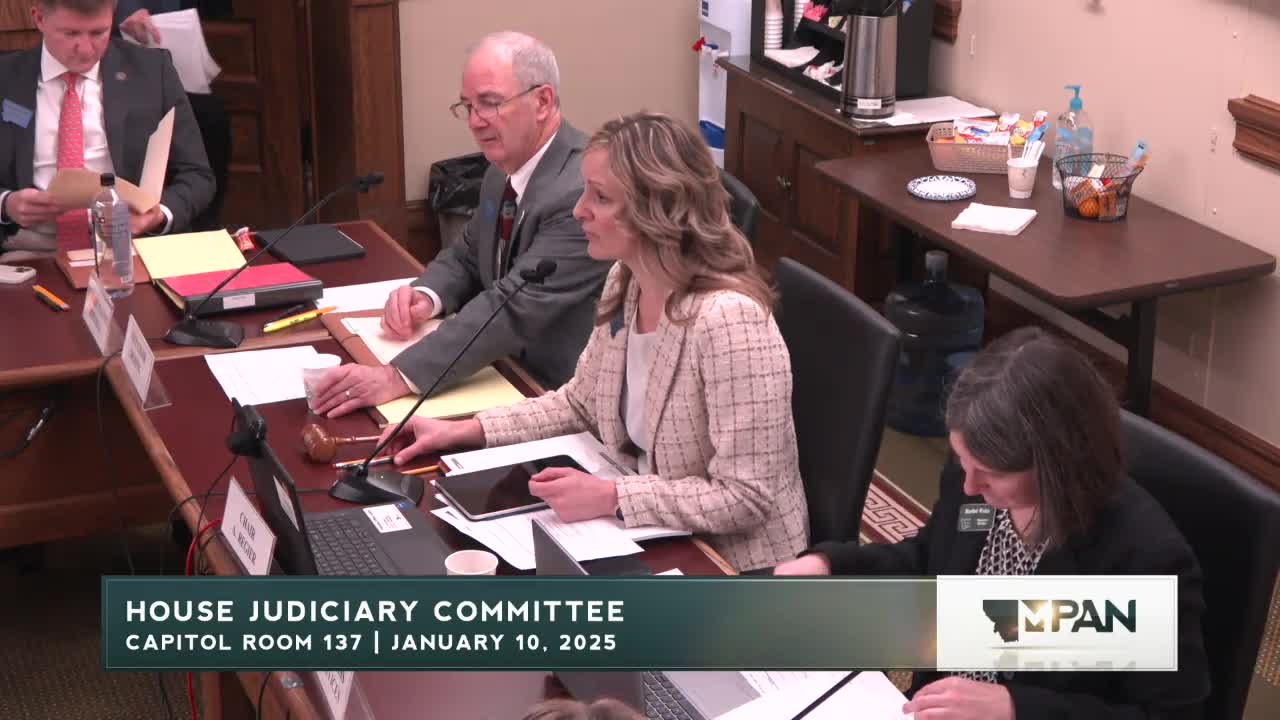Montana House Judiciary hears hours of testimony on HB 121, the "Protect Women Act"
Get AI-powered insights, summaries, and transcripts
Subscribe
Summary
Members of the Montana House Judiciary Committee heard several hours of testimony on House Bill 121, the "Protect Women Act," at a public hearing in Helena that focused on whether public institutions should be required to designate multi‑occupancy restrooms, changing rooms and sleeping quarters by sex and provide a private remedy for failures to protect privacy.
Members of the Montana House Judiciary Committee heard several hours of testimony on House Bill 121, the "Protect Women Act," during a public hearing in Helena. The bill would require covered public institutions to designate multi‑occupancy restrooms, changing rooms and sleeping accommodations for either males or females and would provide a private right of action for certain harms, while including exemptions for single‑user family rooms and ADA accommodations.
Proponents told the committee the bill is meant to protect privacy and safety for women and children. Representative Keri Seekins Crowe, sponsor of HB 121, said in her opening that "The Protect Women Act is not about division or exclusion. It's about ensuring that everyone…can feel safe and respected in spaces where privacy is most critical." Lieutenant Governor Kristin Juras testified in support and said, "men do not belong in women's restroom, in women's prisons, in the private spaces of women, period." Alliance Defending Freedom counsel Beth Nolan summarized the measure's structure: "This bill has 3 main components. It requires that the included facilities designate all multi‑occupancy spaces … it requires that those facilities take reasonable steps to ensure that both men and women respectively have privacy … and then the bill provides a legal remedy for an individual harmed under the bill."
Supporters described cases they said illustrate the problem, including shelter operators who declined to house a man in a women's sleeping area and school parents who said students felt exposed when policies allowed adults who were male at birth to use women's restrooms or locker rooms. Derek Oestreicher of the Montana Family Foundation said the bill would prevent future incidents like the accounts parents provided of discomfort or exposure in school settings. Several proponents emphasized survivors' trauma and cited statistics during testimony.
Opponents said the bill would discriminate against transgender, intersex and gender nonconforming Montanans, would be difficult or impossible to enforce without invading privacy and could expose public and private service providers to significant legal liability and funding losses. Khadija Davis of the ACLU of Montana said, "HB 121 discriminates against trans, intersex, and gender non conforming Montanans and raises serious questions around privacy and enforceability." Robin Turner of LegalVoice testified the bill would require people to use facilities "designated by their original birth certificate," and argued that approach raises constitutional and equal‑protection issues.
Domestic violence and shelter providers described practical problems they said the bill would create. Jennifer Olson of the Montana League of Cities and Towns and multiple shelter directors noted the bill's requirement that covered entities take "reasonable steps" was vague and asked who would define and fund those steps. Amanda Curtis of the Montana Federation of Public Employees told the committee that employees at state and local facilities could be put in the position of enforcing or documenting private medical or anatomical information, and asked whether corrections and shelter staff would be required to verify individuals' sex.
Witnesses also raised legal and funding concerns: opponents pointed to federal nondiscrimination funding conditions for victim service programs such as FVPSA and said losing that funding could force shelters to change operations; Disability Rights Montana warned about ADA intersections; and university and county representatives argued that the Board of Regents and counties manage campus housing and detention operations and that the bill may create costly legal exposure and operational burdens.
Committee members asked a broad set of questions about enforcement, family‑use or single‑user restrooms, university coed floors and the potential fiscal impact on local governments and shelters. Sponsor Seekins Crowe and bill counsel said the bill leaves room for "reasonable steps" by local entities and that family rooms and single‑user facilities are excluded from the designation requirement. Counsel for proponents said the bill is intended to work alongside ADA protections and to provide a remedy where a covered entity "gave permission" for someone assigned the opposite sex to use a designated multi‑occupancy space or failed to take reasonable steps to provide privacy.
The sponsor asked the committee for a "do pass" recommendation. The committee closed the public hearing without taking a vote on HB 121 that day. The committee later moved to executive action on separate bills; members said HB 121 remained subject to further consideration at a later date.
Ending: HB 121 drew extended, often emotional testimony from both sides of the issue and several agency and organizational witnesses pressed the committee for clearer language about enforcement, funding and constitutional consequences. The committee did not vote on HB 121 during the hearing; the sponsor asked for a do‑pass recommendation and the hearing record will accompany any future executive action or committee deliberations.
